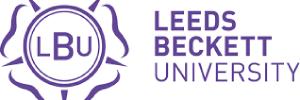
Find out here of a useful framework to help with structuring your day to day activities.
Background
Starting University can be both exciting and challenging. There are lots of new things you need to learn (like cooking and doing the laundry, if you do not live at home), you need to get familiar with a new way of studying that requires you to be more independent, you need to navigate your way through the city and campus and you will be meeting lots of new people (i.e., tutors, housemates and course mates). Most students find it very exciting and invigorating, but some students find it quite demanding.
How can this affect me?
In the middle of a pandemic, some of these things may be easier. For example, if you decide to stay at home, you do not need to learn to cook or learn your way around the campus. However, other things may feel challenging, for instance, feeling isolated. It is entirely natural to feel overwhelmed at times during this period. However help is at hand.
Research consistently shows that to change our mood, we need to change our behaviour. So we here we offer a helpful tool to help you change your behaviour. The A.C.E approach offers a framework that can help build a healthy routine which will boost your wellbeing and mood. This plan was designed for Autism Hampshire by Dr. Abbie Tolland and Claire Murphy with acknowledgment to Dr. Andrew Beck
A.C.E. stands for Achievement, Connection and Enjoyment.
Achievement
A good way of enhancing your mood is to set realistic goals that you can achieve in a short period of time (i.e., feeling you have achieved something on a regular basis). So the first step is to think about what you need or would like to achieve in a week, or at least in a day. This may be for yourself or for other people. When thinking about achievements, there are no right or wrong answers, it is whatever feels like an achievement to you.
Achievement tasks may include: Getting up and dressed, eating regular meals, taking medication, household tasks (such as the washing up) doing the shopping, checking on friends and neighbours, meeting work or study deadlines, regular exercise, learning something new during lockdown, DIY, painting and decorating.
Connection
The connection section of the chart is about how you connect with other people, (email, letters, text, phone, Zoom, Facetime, Skype and so on) nature, animals and yourself. When you are thinking about this section, it is important to think about the different ways of connection and whether they give you more energy or lift your mood, or whether they are tiring and depleting. If some of them are important and tiring, then think about putting something enjoyable before and after.
Enjoyment
In this section of the chart you are thinking about activities that you enjoy and which you are still able to do during lockdown. These activities are really important at the moment. At times of stress, it is important to do more things that we enjoy, while also still doing all the things we need to do.
If your mood is low, this section may be very hard to complete. It may feel like everything is a battle and nothing is enjoyable. That is the impact of low mood. It will help to lift your mood if you start to do things that you used to enjoy. If you can’t remember what those things were, ask someone you trust who knows you well. Alternatively, you can have a look below for possible enjoyable activities. Trying different things or bringing back previous activities count as a big achievement. It is very hard to do this when your mood and energy levels are low and when you do it, it needs to be acknowledged.
What to do next?
Start making your A.C.E. chart.
Practical tips
- Aim for a mix of activities from each column, each day. This will help you to balance your week with things you need to do and that you enjoy and that connect you (see examples below).
- Once you have filled out your own chart, then you can use it to structure your days.
- If you are bored or unsure what to do, you can use your lists for ideas on what to do.
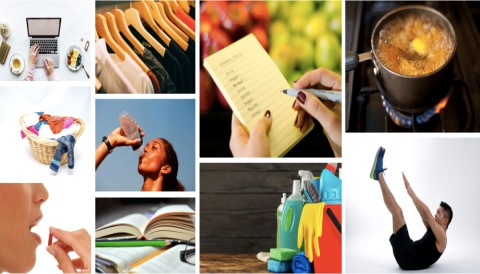
Here are some visual suggestions of things you might enjoy
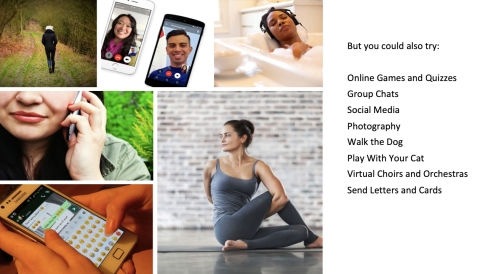
Here are some visual suggestions of how you can feel connected
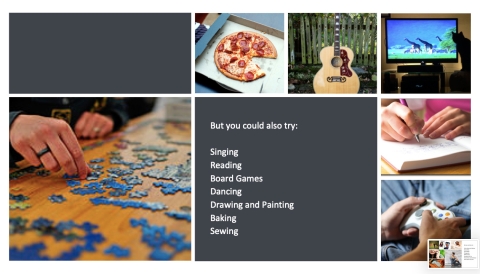
Here are some visual suggestions of things you might want to achieve
You can do an ACE chart for the week...
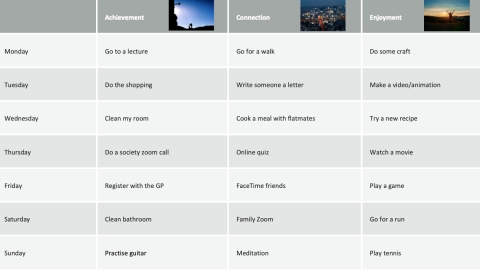
...or you can take it one day at a time
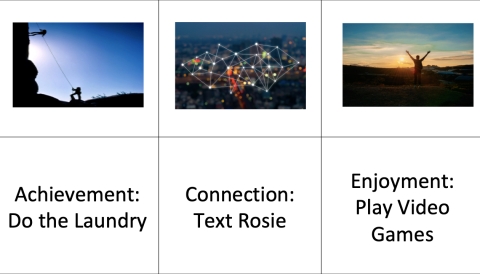
You may want to read
How to reduce stress and anxiety | Autism toolkit
How to manage exams | Autism toolkit
Healthy living | Autism toolkit
This toolkit is an adaptation of the Autism&Uni project led by Marc Fabri from Leeds Beckett University, under license CC BY 4.0. The original Autism&Uni project was funded with support from the European Commission with partners in the UK, Finland, the Netherlands, Poland and Spain. For more information about this project please visit the Autism&Uni website.
Enable University alerts
Turn on notifications for critical updates like closures, safety alerts, and urgent service disruptions.








